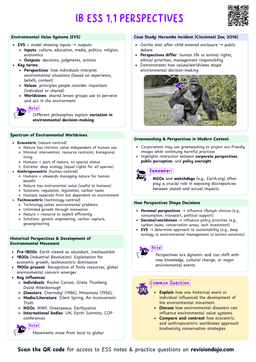Biosphere integrity
Biosphere integrity refers to the capacity of ecosystems to maintain biodiversity (genes, species, functions) and continue providing essential ecological services.
- Biosphere integrity is one of the nine planetary boundaries that define a "safe operating space" for humanity.
- It measures the stability and resilience of Earth's ecosystems, including:
- Genetic diversity (variation within species)
- Functional diversity (variety of ecosystem roles performed by species)
- Species diversity (overall richness of species)
- Scientists have determined that the loss of biosphere integrity is one of only two planetary boundaries already dangerously exceeded.
- Species extinctions are occurring far beyond natural background rates, meaning Earth’s ecological balance is becoming increasingly unstable.
How Much Has the Boundary Been Exceeded?
- The boundary for biosphere integrity has already been crossed.
- Current extinction rates are 100 to 10,000 times higher than the natural background rate.
- Natural extinction rate (background rate): ~1 species per 1 million species per year (Smithsonian estimate)
- Current estimated extinction rate: Up to 10,000× higher than background
- Human drivers include:
- Deforestation
- Overexploitation
- Pollution
- Climate change
- Habitat fragmentation
- Invasive species introduction
Scientists sometimes refer to current biodiversity decline as the Sixth Mass Extinction - the only mass extinction event driven by a single species: humans.
Consequences of Loss of Biosphere Integrity
1. Reduced Ecosystem Stability
- Biodiverse ecosystems have functional redundancy, multiple species performing similar ecological roles.
- When species are removed, redundancy declines, and ecosystems become more fragile.
- A drop in key species can destabilise entire food webs, nutrient cycles, and biological interactions.
2. Loss of Critical Ecosystem Services
- Declining biodiversity reduces:
- Pollination
- Soil fertility and nutrient cycling
- Water purification
- Carbon sequestration
- Disease regulation
- When these services collapse, food security and human well-being are directly threatened.
What are Tipping Points?
Tipping point
A tipping point is a critical threshold where small changes trigger dramatic, often irreversible shifts in an ecosystem.
- A tipping point is a critical threshold beyond which a small change results in rapid, irreversible shifts to a new state.
- Once passed, the system cannot return to its original state even if pressures are reduced.
1. Amazon Rainforest Dieback
- Deforestation and warming reduce moisture recycling
- Regions shift from rainforest → savannah
- Loss of trees releases massive CO₂ → accelerates climate change
- This threatens global climate stability
Scientists warn the Amazon could reach a tipping point where large portions stop functioning as rainforest, leading to catastrophic biodiversity and climate consequences.
2. Collapse of Pollinator Populations
- Bees, butterflies, birds are declining due to pesticides, habitat loss, and climate change
- Leads to:
- Reduced global food production
- Loss of fruiting plants
- Declines in herbivores, cascading up food webs
- This threatens agricultural systems worldwide.
3. Coral Reef Collapse
- Warming oceans cause mass bleaching
- Reefs support ~25% of marine biodiversity
- Their collapse disrupts:
- Fisheries
- Coastal protection
- Marine food webs
- Global oxygen production
4. Arctic Sea Ice Loss
- Reflective ice → absorbs little heat
- Dark ocean → absorbs more heat → warming accelerates
- This amplifies climate change, melting permafrost, releasing methane — a potent greenhouse gas
- Biodiversity loss in Arctic ecosystems accelerates global climate feedback loops.
5. Decline of Phytoplankton
- Responsible for ~50% of the planet’s oxygen
- Acidification and warming reduce photosynthesis
- Impacts marine food webs and carbon sequestration
Why Crossing the Biosphere Integrity Boundary Is Dangerous
- When species go extinct or ecosystems collapse:
- Carbon storage declines (forests, mangroves, peatlands)
- Water cycles become unstable
- Food webs collapse
- Human food security is threatened
- Infectious disease risks can increase
- Climate change accelerates
- Ecosystem services disappear
- If biodiversity loss continues, Earth may shift into a new, less hospitable state, potentially within human lifetimes.
How can conservation efforts balance the needs of biodiversity with the rights of indigenous communities? Consider the ethical implications of displacing people for the sake of protecting ecosystems.
- What is meant by “biosphere integrity” and why is it considered a core planetary boundary?
- How do current extinction rates compare to natural background rates?
- Explain how biodiversity loss can contribute to global tipping points.
- Why might species that have never been discovered be at high risk of extinction?
- How does the loss of functional diversity differ from the loss of genetic diversity?


